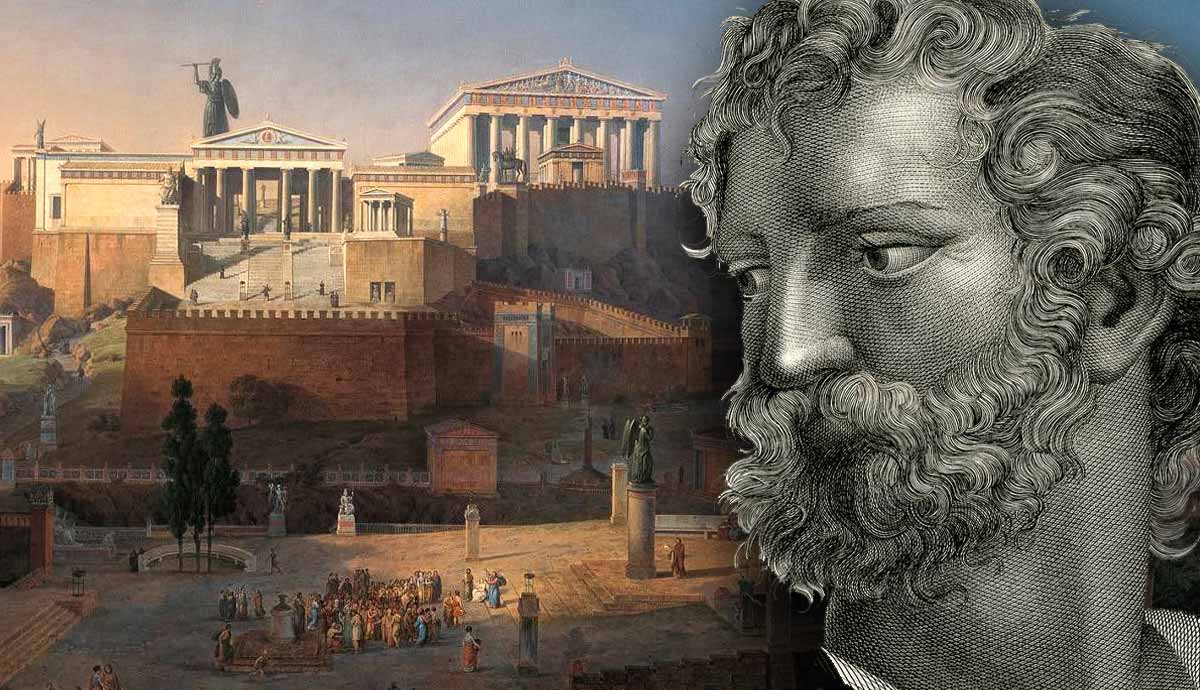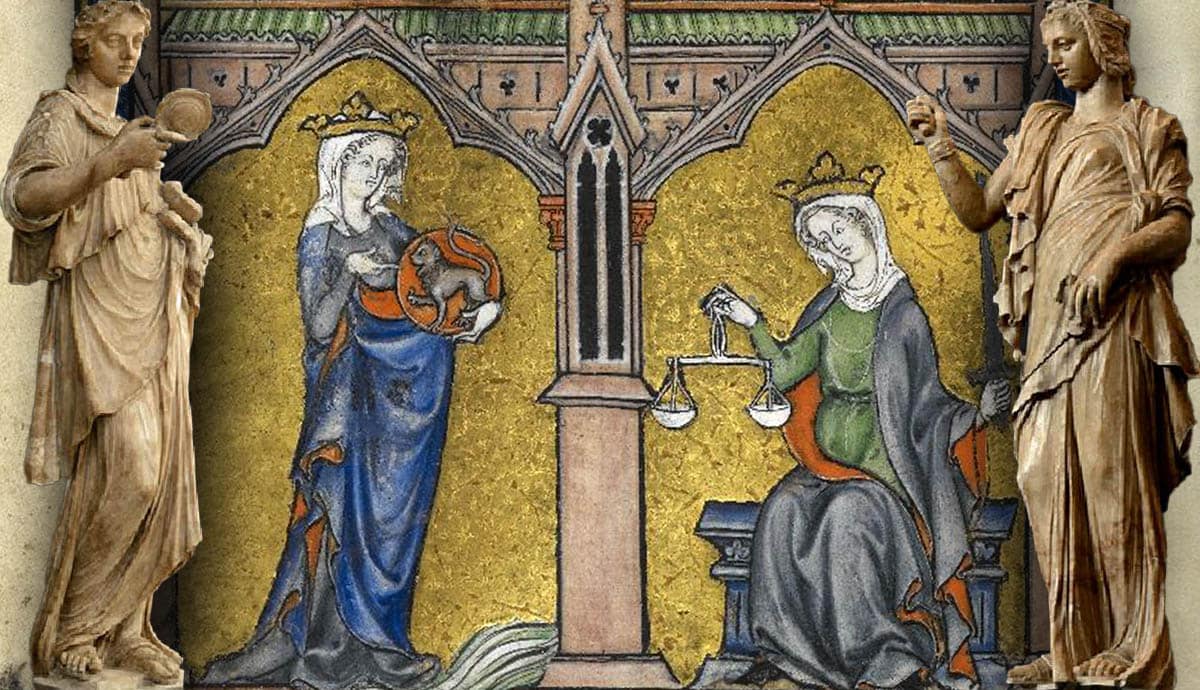
De Interpretatione is Aristotle’s work which is most directly concerned with questions of argumentative logic, meaning, and language. This article sets out certain elements of De Interpretatione, and places them in context with the rest of Aristotle’s philosophy. It begins with a brief biographical section before moving on to a discussion of interpretation in De Interpretatione. The structure of Aristotle’s analysis of language is set out. That analysis includes a characterization of such foundational concepts as the sentence, names, verbs, significance, affirmation, negation, and contradiction We will also discuss the relationship between Aristotle’s conception of language and his conception of logic.
Aristotle’s Life

Aristotle was a Greek philosopher born in 384 BC in Stagira, a town in northern Greece. He was educated at Plato’s Academy in Athens, where he studied philosophy, mathematics, biology, and other subjects.
After leaving the Academy, Aristotle spent several years traveling and studying in different parts of Greece, including the island of Lesbos, where he conducted research in biology and zoology. Aristotle likely inherited his interest in the natural world and medical science from his father, who was a physician. After spending some time in Lesbos, and as a tutor to Alexander the Great, then heir to Macedonia, Aristotle returned to Athens and founded his own school, the Lyceum, where he taught and conducted research for over a decade.
Aristotle’s philosophy covered a wide range of topics, including metaphysics, ethics, politics, biology, and logic. It is the latter that is under discussion in De Interpretatione, but it is worth considering Aristotle’s work as a whole for a moment. His philosophy, and his intellectual output in general, can be seen as an attempt to systematize knowledge. Any such attempt—which is the basis of the construction of science—requires some methodological commitment to the required standards of argument in order for a certain theory to be accepted. De Interpretatione should be seen as a study of logical argument and of analyzing significance in language in order to generate a theory of argumentative sense.
Interpretation in De Interpretatione

The text, which simply translates to ‘On Interpretation,’ is not, as one might expect, simply concerned with interpretation in any of the ways that we tend to think of that word now. It is not (in any immediate sense) concerned with the interpretation of texts (philosophical or otherwise). Indeed, what exactly is being ‘interpreted’ here is a matter of some dispute.
Certainly, the term ‘arguments’ would work as a catchall for what is being discussed here, but it remains controversial in what sense De Interpretatione is concerned with providing a theory of the interpretation of arguments. Perhaps this ambiguity is what has encouraged a tendency in many receptions of De Interpretatione to offer a rather partial account, focusing on certain passages rather than offering an interpretation of the work as a whole.
The beginning of De Interpretatione is one of the parts which has come in for close attention. Aristotle begins by saying that he will first settle what a verb is, what a noun is, and then what an affirmation, negation, statement, and sentence are. This precedes a definition of language that has become very famous and is worth stating here, though a full analysis can be found in the article on Aristotle’s philosophy of language:
“Now spoken sounds are symbols of affections in the soul, and written marks symbols of spoken sounds. And just as written marks are not the same for all men, [5] neither are spoken sounds. But what these are in the first place signs of—affections of the soul—are the same for all; and what these affections are likenesses of—actual things—are also the same.”
The relationship Aristotle draws here is between speech and thought, and it is a relationship of direct correspondence.
A Radical Conception of Truth

Aristotle follows this definition by affirming that for both speech and thought, criteria of truth and falsity can be applied. From this attempt to define language in general, Aristotle moves to discuss parts of language.
A name is a spoken sound that is significant only by convention, and the parts of which signify nothing in themselves. That is true for simple names at least—for more complex names, things are different inasmuch as their parts might signify something in themselves. Verbs are taken to signify time and to represent the temporal dimension of objects.
Here we can see that the conception of language being set out in De Interpretatione is such that the basic structure of language corresponds to the basic structures of reality. This allows Aristotle to rely on a close relationship between language and things at various other points in De Interpretatione.
Indeed, it is a general assumption of Aristotle’s philosophy that language corresponds to reality in a direct way, such that the structure of language and the structure of extralinguistic reality will reflect one another.

Aristotle moves on to a discussion of the sentence, which is defined in terms of its ‘significance.’ A part has to be significant in isolation. The idea of the sentence as the bearer of significance should be emphasized when trying to draw similarities between Aristotle’s approach to language and the approach of more modern logicians and philosophers of language. This is a particularly apt comparison when Aristotle goes on to say that sentences are what can be called true or false, and so draws a relationship between ‘significance’ and ‘truth value’ which will endure up until the present day.
This is where the study of statement-making sentences as a constitutive part of the philosophy of language and logic starts. Many modern-day philosophers would agree with the claim that all other sentences “belong either to the study of rhetoric or poetry.” Continuing to build on this foundation, Aristotle then holds that a simple statement is one which can be affirmed or denied. Implicitly, this means it can be affirmed or denied as a whole. Other statements—complex statements—are compounds of simple ones. Again, there is continuity with modern philosophy, namely in terms of the atomistic account which Aristotle is attempting to give of language.
Language and the World

In a move that is characteristic of Aristotle’s approach to language in terms of the affinity it poses between language and the world, Aristotle moves to consider ‘actual things,’ of which some are universal and some are particular.
Here there is a negotiation between language and the world. There is no contradiction between applying non-universal predicates (meaning descriptions) to universals. Indeed, Aristotle goes further, observing that “there cannot be an affirmation in which a universal is predicated universally of a subject.” He draws the distinction between ‘contradictory opposites,’ such as ‘every man is white’ and ‘not every man is white’, and ‘contrary opposites,’ such as ‘every man is just’ and ‘no man is just.’ A simple affirmation or negation affirms one thing about one thing.
There is a correspondence between the simplest judgments we make in language and the simplest elements of things. Qualities and descriptions exist in a one-to-one ratio. If one name is given to two different things, then that name cannot be the subject of a simple affirmation. For instance, if the word ‘abada’ (a made-up nonsense word in English) became a word (through consistent social practice) both for a fence and for a gate, then the phrase ‘abadas are always white’ could not be simply affirmed or denied.
Aristotle’s Philosophy of Logic

Here we have to bring in some context from Aristotle’s philosophy of logic. Aristotle’s logic is based on deductive reasoning, of which the syllogism is the exemplary form. A syllogism is a kind of logical argument that applies deductive reasoning to arrive at a conclusion based on two premises. A syllogism typically consists of three parts: the major premise, the minor premise, and the conclusion.
The major premise is often a general statement that establishes a broad category or relationship between two concepts. The minor premise is often a specific statement that provides a particular example or instance within the category established by the major premise. The conclusion is a statement that follows logically from the major and minor premises and provides a logical resolution to the argument. The minor premise (or the ‘middle term’) can be seen as bridging two sentences that are not obviously mutually reinforcing into a logically coherent whole. Only simple affirmations can be developed into a syllogism of this kind. We need to have straightforward affirmations in order to relate our three premises to one another. Ambiguity of the kind generated by complex affirmations will not permit this.










